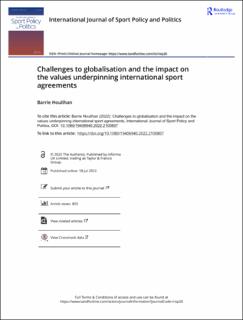| dc.contributor.author | Houlihan, Barrie | |
| dc.date.accessioned | 2022-11-29T15:18:47Z | |
| dc.date.available | 2022-11-29T15:18:47Z | |
| dc.date.created | 2022-08-16T11:05:37Z | |
| dc.date.issued | 2022 | |
| dc.identifier.citation | International Journal of Sport Policy and Politics. 2022, Artikkel 2100807. | en_US |
| dc.identifier.issn | 1940-6940 | |
| dc.identifier.uri | https://hdl.handle.net/11250/3034827 | |
| dc.description | This is an Open Access article distributed under the terms of the Creative Commons Attribution-NonCommercial-NoDerivatives License (http://creativecommons.org/licenses/by-nc-nd/4.0/), which permits non-commercial re-use, distribution, and reproduction in any medium, provided the original work is properly cited, and is not altered, transformed, or built upon in any way. | en_US |
| dc.description.abstract | Accompanying the spread of sports as a global business and a political/diplomatic resource have been attempts to underpin the organisation and practice of sports with a set of Kantian values that maintain its economic/cultural utility while also protecting the rights and dignity of key stakeholders, especially athletes. In recent years, there has been growing evidence of challenges, at both the grassroots and corporate/governmental level, to the globalisation of liberal Enlightenment values. This paper addresses three research questions: 1) to what extent are the Kantian values that underpin international rights conventions such as the Universal Declaration of Human Rights under threat from anti-globalisation pressures; 2) to what extent are these challenges evident in sport and 3) how secure are the liberal values that underpin international sports documents/agreements such as the Olympic Charter, the WADA Code, the Brighton Plus Helsinki 2014 Declaration on Women and Sport and the Universal Declaration of Player Rights? It is argued that the challenges are substantial and have significant consequences for the values underpinning global sport. The focus of analysis is on three elements of the global sports infrastructure: international sports agreements/declarations, national identity politics and international sports organisations. It is argued that the strength of the challenges is undermining the values on which global sport has been built either by attempts to redefine core liberal values or by simply ignoring them. The same countries that are seeking to undermine global human rights conventions are also reluctant to be bound by sports-related institutions and conventions. | en_US |
| dc.language.iso | eng | en_US |
| dc.subject | anti-globalisation | en_US |
| dc.subject | globalisation | en_US |
| dc.subject | international sport agreements | en_US |
| dc.subject | liberal values | en_US |
| dc.subject | sport | en_US |
| dc.title | Challenges to globalisation and the impact on the values underpinning international sport agreements | en_US |
| dc.type | Peer reviewed | en_US |
| dc.type | Journal article | en_US |
| dc.description.version | publishedVersion | en_US |
| dc.rights.holder | © 2022 The Author(s) | en_US |
| dc.source.pagenumber | 14 | en_US |
| dc.source.journal | International Journal of Sport Policy and Politics | en_US |
| dc.identifier.doi | 10.1080/19406940.2022.2100807 | |
| dc.identifier.cristin | 2043334 | |
| dc.description.localcode | Institutt for idrett og samfunnsvitenskap / Department of Sport and Social Sciences | en_US |
| dc.source.articlenumber | 2100807 | en_US |
| cristin.ispublished | true | |
| cristin.fulltext | original | |
| cristin.qualitycode | 1 | |
